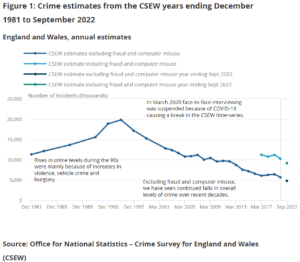Dear Ms Thornberry,
Thank you for your letters regarding the use of statistics on crime and policing by Ministers. You asked about a statement the Prime Minister made on 22 March about crime. You also asked about an interview in which the Minister for Crime, Policing and Fire discussed police recruitment.
The Prime Minister said that
“since the Conservatives came into power, crime is down 50 per cent”
This statement is an accurate description of estimates of total incidents of crime against individuals as measured by the Crime Survey for England and Wales (CSEW), excluding fraud and computer misuse. Figure 1 [1] from the latest ONS bulletin at that time shows this trend since 1981.
As you highlight in your letter, the UK Statistics Authority has in the past advised that fraud and computer misuse should be included in statements about overall crime wherever possible. However, the CSEW only started asking questions related to these offences in 2015. The Prime Minister therefore used the most appropriate data source for comparing trends in the total level of crime since 2010.
Nevertheless, it would support public understanding if Ministers using this comparison were explicit in stating the offences excluded, or instead used figures relating to specific types of offences. The CSEW records a wide variety of offences which vary greatly in their severity.
In your letter of 18 April you asked us to look at statements on police recruitment levels made by the Minister of State for Crime, Policing and Fire, Chris Philp MP, during an interview on Good Morning Britain.
The Minister said
“If you take 2010 as the starting point – 145,000, that was the previous peak, March 2010 – when the figures come out next week, you’ll see that they are higher than that 145,000.”
He also said,
“I’m not going to speculate precisely, but it will be some margin higher, we’re talking about some thousands higher [than March 2010].”
You suggested these statements might have been made using knowledge of the statistics ahead of their scheduled publication date on 26 April, contrary to the Code of Practice for Statistics. We spoke with Home Office statisticians and the Minister’s office and found no evidence of that. The latest published police officer uplift statistics at the time of the interview showed that in December 2022 there were 145,658 police officers in England and Wales, and that the net increase due to the Police Uplift Program (PUP) since October 2022 was 1,420. From this information, and other management information[2], it was reasonable to have inferred that the March 2010 figure could have been exceeded by several thousand.
Yours sincerely,
Sir Robert Chote
Chair
FOOTNOTES
[2] As reported in the Office for Statistics Regulation’s July 2022 compliance assessment of the police uplift statistics, the National Police Chiefs’ Council (NPCC), produces a monthly management information report and dashboard on the PUP for police forces and Ministers. Statisticians in the Home Office informed us that the last management information data the Minister had access to was from February 2023.
NOTES
- The CSEW provides the best estimate of long-term trends in crime. As a household survey of individual adults, it does not provide estimates for crimes against businesses (such as non-domestic burglary), societal crimes such as drug taking, or crimes against children.
- There is a break in the CSEW time series because of the suspension of face-to-face interviewing between March 2020 and October 2021, during the COVID-19 pandemic. Data for the year ending September 2022 are based on interviews conducted since the resumption of fieldwork in October 2021, measuring experiences of crime in the 12 months before the interview. This means crimes recorded in the most recent estimates could have occurred as far back as October 2020 and as recently as August 2022.
Related links
Letter from Emily Thornberry MP to Sir Robert Chote – crime statistics
Letter from Emily Thornberry MP to Sir Robert Chote – crime and police statistics

